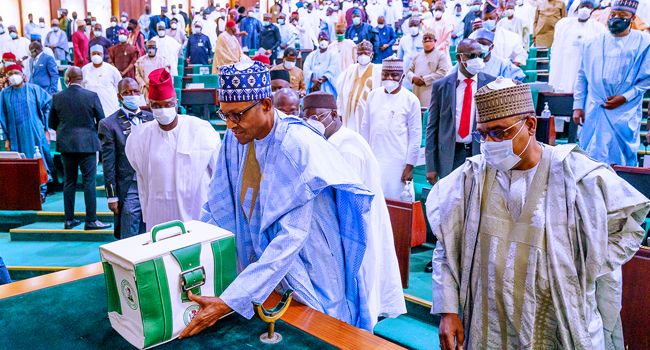Subject to approval of the National Assembly, the federal government would be spending N8.074 trillion on five priority sectors for the government. The sectors are defence & security, education, health, infrastructure and social development & poverty reduction programmes. President Muhammadu Buhari recently presented the N20.5 trillion national budget to the lawmakers.
Defence & security sector has the highest vote of N2.74 trillion (13 per cent of the total budget). That amount includes recurrent and capital expenditure vote for the military, police, intelligence and paramilitary. Nigeria is facing much of insecurity challenges that has gravely disrupted production and pushed up prices of farm produce across the country.
From the N2.05 trillion (10 per cent of the budget) for education sector, paltry N470 billion is earmarked for tertiary education revitalisation and salary enhancement, indicating that government maybe heading for another showdown with university lecturers. N1.23 trillion is the amount provisioned for Federal Ministry of Education and its agencies (recurrent & capital expenditure) with the other amount voted for UBEC and TETFUND.
Health Sector N1.58 trillion or eight per cent of the proposed budget, while the government plans to spend N756 billion (four per cent) on social development and poverty reduction programmes of the present administration.
Curiously, only five per cent or less than N1 trillion of the entire budget is voted for building of infrastructure. In simple terms, the federal government is planning to spend a little fragment of the budget (N998.93 billion) through ministries of Works & Housing, Power, Transport, Water Resources, Aviation for provision of infrastructure that is largely in deficit across Nigeria.
Debt to CBN
Speaking the ministerial presentation of the 2023 draft budget yesterday, minister of finance, budget and national planning Zainab Ahmed disclosed that federal government’s total debt to the Central Bank of Nigeria (CBN) through ways and means currently stands at N20 trillion.
The minister said she now has President Buhari’s approval “to securitise, then the securitisation will be over a 40-year period with interest rate of nine per cent but over the years we have been paying the interest component at current rate that is charged on the Ways and Means.”
2022 budget performance
Mrs Ahmed gave a breakdown of the performance of the 2022 national budget up to August this year. Official figures showed that as of August 2022, federal government’s retained revenue was N4.23 trillion, 64 per cent of the prorata target of N6.65 trillion.
The government’s share of oil revenues was N395.06 billion (representing 27.1 per cent performance), while non-oil tax revenues totalled N1,549.91 billion – a performance of 102.9 per cent. Company income tax and value added tax collections were N826.27 billion and N210.36 billion, representing 136.3 per cent and 99.6 per cent of their respective targets.
The aggregate expenditure for 2022 is estimated at N17.32 trillion, with a prorata spending target of N11.55 trillion at the end of August.
The actual spending as of August 31 was N9.56 trillion. Of this amount, N3.52 trillion was for debt service, and N2.89 trillion for personnel costs, including pensions. N1.78 billion was released for capital expenditure.
The fiscal deficit for 2022 is estimated at N7.35 trillion. The N5.33 trillion deficit as at August is N430.82 billion above the prorate level. The level of borrowing is N1.26 trillion ahead of the July target.
2023 revenue expectation
Meanwhile, the federal government has said it will generate 80 percent of the total revenue for the 2023 budget from non-oil sources, while 20 per cent of projected revenues is expected from oil-related sources. The total revenue available to fund the 2023 the budget is estimated at N9.73 trillion.
That includes the gross revenues of 63 government-owned enterprises totaling N3.48 trillion. Federal government oil revenue share is projected at N1.92 trillion, non-oil taxes are estimated at N2.43 trillion, and government independent revenues are projected to be N2.21 trillion. Other revenues total N762 billion. The GOEs are expected to remit N1.06 trillion to government’s consolidated revenue fund, and retain N2.42 trillion for their expenditures and reserves.
Expenditure
The 2022 aggregate expenditure (inclusive of GOEs and project-tied Loans) in the proposed budget is projected to be N20.51 trillion, which is 18.4 percent higher than the amended 2022 Budget.
The government would be spending N6.31 trillion or 30.8 percent of total expenditure on debt service in 2023. This is 71.2 percent higher than 2022 estimate as it includes interest payment of N1.2 trillion for Ways and Means.
Recurrent (non-debt) spending, estimated to amount to N8.47 trillion, inclusive of N200 billion social investment programme.
Aggregate capital expenditure of N5.34 trillion is 26 per cent of total expenditure; and 8.8 percent lower than the 2022 Budget (inclusive of capital component of statutory transfers, GOEs capital & project-tied loans expenditures).





